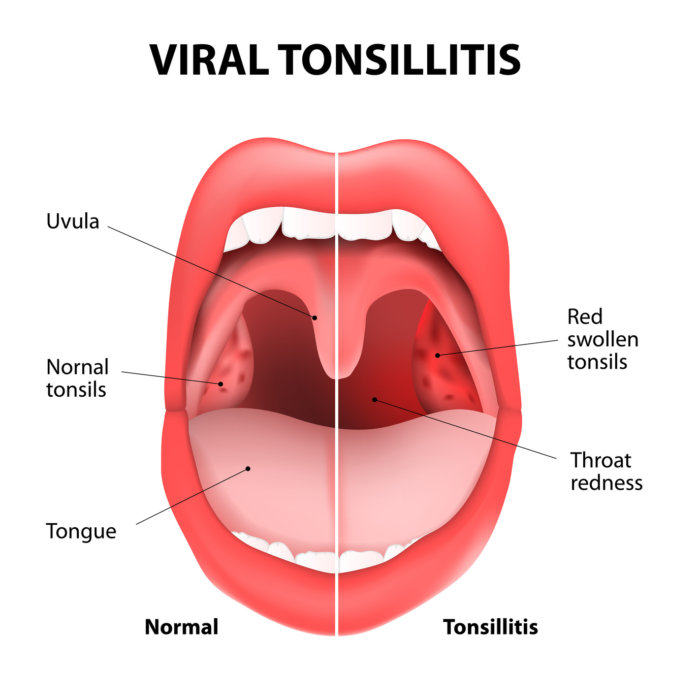Sore throat: When to contact a doctor
When should you contact a doctor?
I am not a doctor and I prefer to work with doctors. Even if I were a doctor, there are some illnesses that require specialized medical monitoring. Viral throat infections are one example among many of such illnesses when you should see a doctor before or during homeopathic treatment. How do you decide if you should call a typical doctor, a homeopath or rely on self-care? Here are some suggestions for thinking about your decision. See the check list at the end of this post.
Do you have a viral throat infection?

Pain sensitivity
How sensitive to pain are you? If you are very sensitive, you may find yourself running to doctors to cure a simple sore throat. Because you are running to doctors who typically tend to over-medicate, you may be already taking unnecessary antibiotics and weakening your immune system. Take care because studies show that doctors tend to over prescribe antibiotics when they are not needed.
If you are insensitive to pain, to the contrary, you may be avoiding the doctor when you really should have a throat culture taken. Or you may suffer from the common fear of doctors. Your decision should not be motivated by fear. Also, pain alone will not tell you if you have a viral sore throat. The judgment that you should at least have a throat culture taken requires you to know yourself. Remember, if seeing a specialist is expensive for you, a throat culture will rule out the need to call a doctor. Still, someone needs to take a swab of your throat in order to have lab work done. So, make the best possible use of community resources if, for example, health insurance is problematic.
When do homeopaths work with doctors?
Most sore throats will heal without any treatment, including homeopathic treatment. If you have a sore throat that could be true strep throat (caused by a virus), then you should see a specialist in order to make sure that you do not develop the after-effects of true strep throat. Rheumatic fever, Kidney infection, and Rheumatic heart disease can follow viral strep throat and they are all life threatening and have long-term consequences. They can start with a poorly treated viral sore throat. Other severe throat conditions such as diphtheria or peritonsillar abscess, will require the help of a specialist as well. Regardless of the severity of the disease, homeopathy will speed up healing.
What is a normal mouth?
Normally, we do not open our mouths to look inside. In social settings, showing the inside of our mouths is taboo. This does not mean that we cannot look inside our mouths in private. Our mouths reveal a distant glimpse of our inner organs. For that reason, everyone should know how the inside of their mouth looks.
Why are tonsils important?

Tonsils Gaurd our body
Tonsils are primary glands of the immune system. Various immune cells including white blood cells are created there.
Our mouth is the gate to our inner bodies/fortress/temple
So, our mouth and throat are like the gate to a heavily guarded fortress. A temple is a fortress of the soul. Japanese temples are often guarded by two superheroes. Our tonsils are like those superheroes. What is happening inside the fort/ temple is directly reflected by the action that you see at the gate. One strategy of battle is for the enemy to enter the fort from below and then to open that gate. Overdosing medicines can do this in our bodies. When the gate is opened the enemy rushes in.
During peace/health all of the support for the internal organs passes through this gate. The food vendors, the doctor/medicine and etc. all pass through this gate. So, by observing the conditions at the gate, you can understand much about what is happening inside. When you look inside your mouth, you are doing just that.
Tongue appearance
 Because our inner organs are reflected by the appearance of our tongues, Chinese medical specialists base part of their diagnosis on the appearance of tongues. The great variety of tongue conditions is astounding. Here we are concerned with the throat. The condition of your tongue reflects the health of your throat and your inner organs. So when you look in the mirror to look at your mouth, include your tongue. You do not need to know a diagnosis. You are only looking at what is normal for you.
Because our inner organs are reflected by the appearance of our tongues, Chinese medical specialists base part of their diagnosis on the appearance of tongues. The great variety of tongue conditions is astounding. Here we are concerned with the throat. The condition of your tongue reflects the health of your throat and your inner organs. So when you look in the mirror to look at your mouth, include your tongue. You do not need to know a diagnosis. You are only looking at what is normal for you.

Look at your tonsils
With a flashlight, you can see your tonsils. You don't need a medical education to do this. You may have to hold down your tongue with something like the back of your toothbrush. So, this is more difficult. You may need help.(Some people have a strong gag reflex and cannot do this without professional help.) You should know how your mouth including your tonsils looks normally. If your doctor is looking at your throat, ask him to stop and give you a chance to look too. Don't be passive. If he knows that you want to care for yourself, a good doctor will treat you differently. If you are caring for other, look at their mouths. If possible, look at many mouths. Knowing what is normal is a big step forward toward knowing how to care for yourself when you are sick.
Different mouths are not necessarily sick
We all have problems that seem unrelated to the mouth area. Often those problems are also reflected in the mouth. You do not need to be so sick that you have to see a doctor to have a tongue and mouth that looks different from the mouth of a pristinely healthy young child. Two relatively healthy people can have mouths that look quite different. If you knew a little Chinese medical diagnosis, this difference might be meaningful. But, without such training, just remember the appearance of your own mouth. When you brush your teeth, routinely take a peek at your mouth. Then recall your healthy mouth when you look at your sick mouth. This is a good time to take a "selfie", a picture of yourself using your cell phone camera.
Signs of a sick body
When you are very ill, your mouth should look different from your healthy mouth. The difference should be obvious. Red only could mean you are going to get better with no medicine. So local tissues are simply inflamed. But, there could be deformations as is evident in the photo below. Purple means your blood cells may be losing the battle with micro organisms. Usually, you don't need to see a doctor for a red sore throat. There are plenty of good herbal remedies and homeopathic self-care works too. Purple means dead red blood cells are so numerous that they cannot all be filtered out. Look at other signs and decide if you should see a doctor.

Observe high alert systemic symptoms
The need to see a medical specialist should be fairly obvious because there are other signs besides the appearance of your tonsils. The high alert symptoms are systemic and severe. High temperature or a temperature that does not go down for days should are potentially dangerous depending on your overall health condition and age. The severity of your cough or abscess is also information to help you decide if you should call the doctor. Much more than just your mouth and throat are affected. Particularly, your digestive system including your liver may be affected. That's why the appearance of your tongue changes. You need medical diagnosis when these symptoms are severe. What is severe? Again your evaluation will depend on how you react to pain. Fear of doctors can be another factor. Writing down these important factors may help you make a decision. (See the list at the bottom of the page.)
Reflect on past experience of these symptoms
"Know thy self". Is your condition is a reoccurrence of the same old symptoms? Does the doctor gives you medications and the same problem just reoccurs? Then probably more medication will not solve your problem. You may want to stay in touch with your doctor as you seek alternative medical care, but you may wish to avoid medications that seem to do more harm than good. If you have a good doctor, he will agree with you.
Check lists
Should I call a typical doctor?
Condition |
Yes, call an MD |
No, wait and observe or self-care |
| Mouth appearance | Purple and obviously swollen. I do not remember my healthy mouth's appearance. | Normal or slight change such as red or slightly swollen. I know the healthy appearance of my mouth. |
| Fever | Strong body but above 104° F.
Continuous low fever. Above 100° F but you are weak and need to consider other conditions |
Below 104 F depending on your health history. Discuss this with your doctor. |
Which should I call? A homeopath or a typical MD?
Attitudes |
Yes, call an MD. |
No, wait and observe or call a homeopath |
| Fear of doctors | Yes | Neutral |
| Medication does not prevent recurrence | No | Yes |
| Antibiotic usage history | My MD avoids antibiotics if possible. | My MD automatically gives antibiotics and other strong medications.(Maybe you should find a better MD.) |

